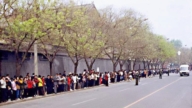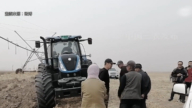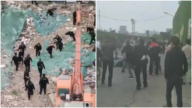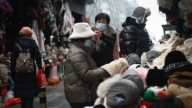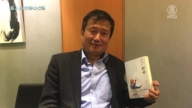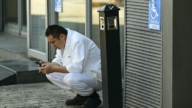【新唐人2011年5月9日讯】最近,被中共指控“非法向境外提供情报”而被判13年重刑的韩战学者徐泽荣 博士,再次受到舆论关注。海外媒体报导,他有可能在今年(2011年)6月提前出狱。分析人士认为,中共滥用“保密法”,所谓的“国家机密”成为无处不在的“陷阱”。
现年57岁的徐泽荣是香港居民,牛津大学政治学博士。他是研究韩战问题的专家,2000年7月徐泽荣被当局指控“泄露国家机密”,2001年12月被广东省深圳市中级法院以“非法向境外提供情报”罪和“非法经营出版”罪,判处13年重刑。
《美国之音》报导,徐泽荣有望在今年(2011年)6月提前出狱。一直以来,徐泽荣一案所暴露的中国人权问题深受世界关注,国际上很多学者、学术组织以及非政府组织,多年来不断呼吁中共早日释放这位学者。
出生于高干家庭的徐泽荣,先后在哈佛大学和牛津大学攻读政治学,回香港后从事学术研究及出版工作,被捕时任职广州社会科学院客座教授、广州中山大学东亚研究所副研究员。
当局指控他在做博士论文时,从朋友家中得到50年前有关韩战的中共内部资料,复印后转交给韩国的研究人员。
加拿大《汉和防务评论》刊物总编辑平可夫,对徐泽荣案非常了解。他曾对《美国之音》表示,在西方世界,有些军情连一般的军事爱好者都知道,可是在中国,这些全部是机密。当局只要想打击谁,就使用“泄露国家机密罪”。平可夫说,徐泽荣的案子就更奇怪了,因为他涉及的是50年前的韩战资料。他强调:“中国社会是一个到处充满陷阱的社会。”
而根据中国的“保密法”,国家绝密的保密期限为30年、机密为20年、秘密为10年,除有特殊规定外,到期自行解密。而徐泽荣获得的韩战材料是50年前的,即使当初是绝密资料,也早已经解密了。但当局为了给徐泽荣定罪,硬是让广州军区做了一个所谓鉴定,号称徐泽荣拿到的文件属于国家机密。
香港《开放》杂志总编辑金钟对《美国之音》表示,徐泽荣获罪的真正原因是:他被捕前不久,曾在香港《亚洲周刊》发表文章《马共秘密电台湖南曝光》,文中揭露了中共支持马来西亚共产党进行赤化宣传和武装叛乱的内幕,从而激怒当局。
金钟(香港《开放》杂志总编辑):“最重要的恐怕是,他在《亚洲周刊》上写文章报导,马来西亚共产党在湖南省益阳地区某山头上面搞秘密电台。(这件事情)以前一直没有人知道,更没有人报导。”
金钟强调指出,中共的思维意识狭隘而保守,充斥着偏见与自卑,滥用所谓保密法就是一个典型例证。
而除了徐泽荣外,身陷中共“保密法”陷阱的记者和专家学者更是数不胜数。仅近年就有上海律师郑恩宠、香港《文汇报》驻东北记者姜维平、湖南记者师涛、新加坡《海峡时报》驻北京记者程翔、揭露中共腐败的谭作人等。
前北京《经济学周报》副主编高瑜,也曾被中共当局以“泄露国家机密罪”判处6年徒刑。她对《美国之音》表示,目前,大陆媒体人人自危,自我审查非常严重;大陆的新闻自由不断恶化,现在的舆论环境甚至还不如上世纪80年代。
新唐人记者李谦、李若琳综合报导。
CCP’s Secrets Act Trap
Korean war scholar Xu Zerong was jailed
for 13 years by Chinese government for so-called
“providing classified intelligence to other countries.”
Overseas media reported he might be released in June.
Analysts believe CCP abused the Secrets Act
by setting traps for innocent people.
The 57-year-old Hong Kong’ citizen Xu Zerong,
also Oxford University political science doctor
and a specialist on Korean wars, was accused
in July 2000 of disclosure of state secret,
and sentenced in December 2001 to 13 years
by Shenzhen intermediate court for illegal
provision and publishing of intelligence data.
VOA said he was likely to be released early June.
His case was exposed through world’s attention
on human rights issues in China.
International organizations have been calling
for his release.
Born in a senior official’s family,
Xu Zerong studied politics in Harvard and Oxford,
and did academic and publishing work in HK.
He was a visiting professor of social science
in Guangzhou and East Asian Institute fellow
in Zhongshan University when arrested.
He was accused of disclosing CCP’s intelligence
about the Korean War to his friends in Korea.
Ping Kefu, Chief Editor of Kanwa Intelligence Review,
was highly aware of Xu’s case. He told VOA that
some well-known military intelligence in the West
had been kept secret in China.
Disclosure of state secrets was the usual excuse
to persecute people at will by CCP.
Ping Kefu said, Xu’s was a weird case, as it is
all about Korea War 50 years ago.
He thinks that in China, traps are ubiquitous.
According to China’s Secrets Act, 30-year is
the confidential period for “top-secret” information.
A “second-grade secret” is kept for 20 years,
while a “normal secret” 10 years.
Xu’s case involves information of 50 years ago.
This is far beyond any legal deadlines.
CCP imposed accusations on him by using
Guangzhou Military’s false testimony.
Jin Zhong, Chief Editor of Open magazine in HK
told VOA, the real reason for Xu’s persecution
was that he published an article in Asia Weekly
about CCP’s support of Malaysian Communist Party’s
propaganda and military rebels.
Jin Zhong: “He revealed in Asia Weekly
that MCP had secret radio station in Yiyang, Hunan.
It was unknown to the public and never reported.”
Jin Zhong said, the CCP was partial and biased,
to which the Secrets Act misuse was a perfect proof.
Apart from Xu Zerong, unjust Secrets Act cases
have been abundant, like Hunan reporter Shi Tao,
HK Wen Wei reporter in east China Jiang Weiping,
Zheng Enchong from Shanghai, Cheng Xiang
of Singapore’s The Straits Times in Beijing,
and the CCP’s critic Tan Zuoren.
Former deputy chief editor of Economist Weekly,
Gao Yu, was given 6 years in the same accusation.
Gao told VOA, in China today, everyone in the media
is subjected to CCP’s scrutiny.
Press freedom has been incrementally repressed.
It’s worse than the 1980s.
NTD reporter Li Qian and Li Ruolin


